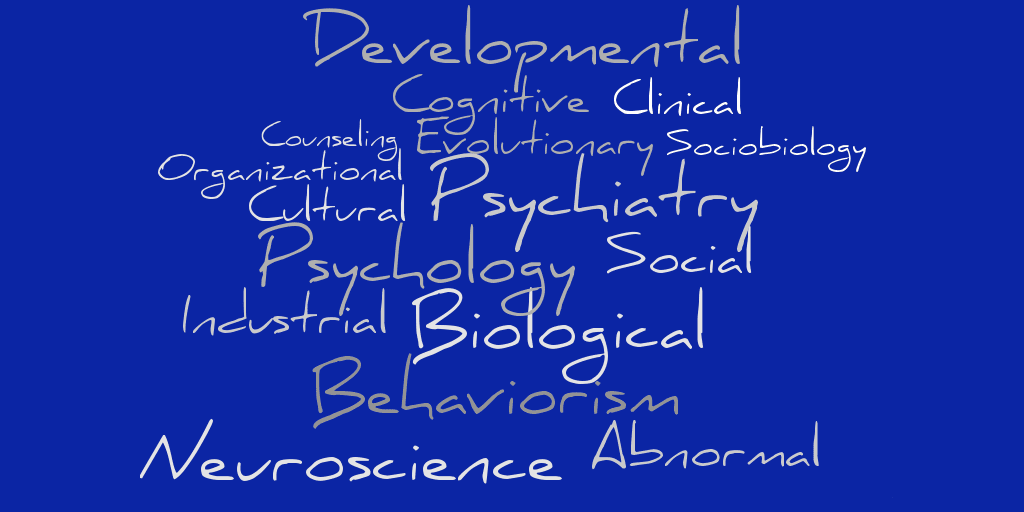This post is a short excerpt from my book Master Introductory Psychology
Modern Approaches to Psychology
The diversity of questions that psychology aims to answer necessarily requires a diversity of approaches. In attempts to answer questions on all nature of human experiences, psychology gleefully borrows or steals from other disciplines, creating a quilt of sub-fields with the overall aim of understanding all thought and behavior. As psychology has grown to incorporate these many sub-fields, greater specialization is required of psychological researchers. No longer can one researcher be familiar with the happenings and developments in all areas of psychological inquiry. As a result, most psychologists today probably fall into one of the following main categories.
Following behaviorism’s decline, the role of mental processes which were not directly observable became an area of greater research. Cognitive psychology looks to understand how our thoughts influence our behavior. The way we think, use language, frame questions, and consider context can affect our decision-making, our ability to solve problems, and our emotional state.
Darwin would be proud to see that his legacy lives on in psychology, even if the functionalism of William James has faded. The drive to understand the adaptive purposes of our mental abilities continues today in the form of evolutionary psychology. While Darwin didn’t have knowledge of specific mechanisms of heredity (like genes), modern day evolutionary psychologists continue to use his approach to uncover how our psychological traits have been selected for throughout human history. One key idea used in evolutionary psychology today is that the mind consists of specialized modules, each with different functions, which have been selected for over millions of years of evolution. For example, an evolutionary psychologist may consider how the human brain seems innately equipped for language acquisition, and therefore examine the role language may have played in our species’ survival.
Evolutionary psychologists may also look to understand the role of genes and evolution in shaping our relationships, interactions, and social behavior in a closely related sub-field known as sociobiology.
If you’ve ever wondered how children come to learn language or how the myriad changes of puberty affect the teenage brain, these lines of inquiry will quickly lead you to developmental psychology. Acknowledging that our mental and physical lives change throughout our lifespan, developmental psychologists seek to understand the progression of these changes in our biology and cognition from the nursery all the way to the nursing home.
Neuroscience looks to understand the links between our brain activity, our thoughts, (cognitive neuroscience) and our behaviors (behavioral neuroscience). This is an area where some of the greatest strides in psychology have occurred in recent years, thanks in large part to major advances in brain imaging and scanning technology. Armed with the ability to monitor brain function nearly as it happens, we finally have a window into the mind that can reveal patterns of activation and specific regions of specialization in far greater detail than ever before.
As John Donne wrote, “no man is an island” and some psychologists have taken this notion to heart. Social psychology looks to understand the complexity of our interpersonal interactions, ranging from the perils of stereotypes, aggression, and conflict, to the heart-warming moments of empathy, altruism, and bonding. Our daily interactions and personal relationships with others can have important influences on our thoughts, behaviors, and emotions and we should never forget that we are inherently social animals.
Psychology has also grown in its understanding of culture and how society as a whole shapes who we are. In our globalized world, understanding the role of culture on one’s behaviors, interpretations, and expectations is no longer just the concern of diplomats, ambassadors, and kings. Now we are all interacting on a global scale, and the results can be both rewarding and perplexing. Borrowing from anthropology and sociology, cultural psychology has looked to tease apart the influences of culture on our thoughts, emotions, and behaviors, showing the ways that culture defines us, as well as the ways we all share one human experience.
Enterprising psychologists have also set their sights on the workplace, looking to understand how to improve worker morale, productivity, and well-being in a subfield known as industrial/organizational psychology.
And of course, a chapter on approaches in psychology would be remiss not to mention the sub-field that most people bring to mind when they hear the term psychology, and that is abnormal psychology, the study of mental illness. This field incorporates many of the approaches above in considering how our minds can go wrong and what we can do to fix them. This field brings together researchers from all approaches in a number of different capacities from medical doctors trained to diagnose mental illness and prescribe medication (psychiatrists) to therapists and counselors who may specialize in cognitive or behavioral therapies for particular types of illness or conflict. These may be clinical psychologists who focus on mental illness or they may be counseling psychologists who focus on other types of conflict such as anxiety or stress related to work and school, interpersonal relationships and family issues, or certain types of addictions.
What’s the “best” approach?
If this dizzying array of approaches is stressing you out, remember to step back and consider the purpose for each. Each individual approach is just another way of attempting to answer a psychological question. Should we focus our research on possible genes responsible or childhood experiences? On hormones or cultural influences? Remember that each focus temporarily ignores the others in order to simplify what are very complex questions. It’s easier to ask how genes might relate to depression than to try to understand everything about depression all at once.
Excerpt from Master Introductory Psychology

